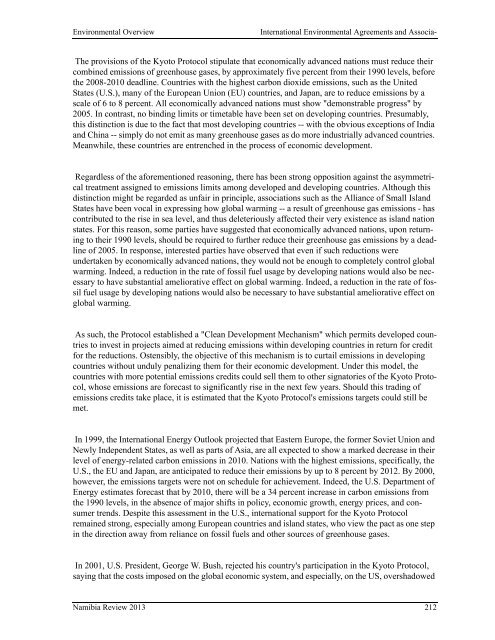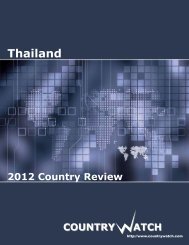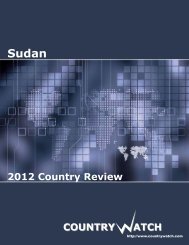Namibia - CountryWatch
Namibia - CountryWatch
Namibia - CountryWatch
Create successful ePaper yourself
Turn your PDF publications into a flip-book with our unique Google optimized e-Paper software.
Environmental Overview International Environmental Agreements and Associa-<br />
The provisions of the Kyoto Protocol stipulate that economically advanced nations must reduce their<br />
combined emissions of greenhouse gases, by approximately five percent from their 1990 levels, before<br />
the 2008-2010 deadline. Countries with the highest carbon dioxide emissions, such as the United<br />
States (U.S.), many of the European Union (EU) countries, and Japan, are to reduce emissions by a<br />
scale of 6 to 8 percent. All economically advanced nations must show "demonstrable progress" by<br />
2005. In contrast, no binding limits or timetable have been set on developing countries. Presumably,<br />
this distinction is due to the fact that most developing countries -- with the obvious exceptions of India<br />
and China -- simply do not emit as many greenhouse gases as do more industrially advanced countries.<br />
Meanwhile, these countries are entrenched in the process of economic development.<br />
Regardless of the aforementioned reasoning, there has been strong opposition against the asymmetrical<br />
treatment assigned to emissions limits among developed and developing countries. Although this<br />
distinction might be regarded as unfair in principle, associations such as the Alliance of Small Island<br />
States have been vocal in expressing how global warming -- a result of greenhouse gas emissions - has<br />
contributed to the rise in sea level, and thus deleteriously affected their very existence as island nation<br />
states. For this reason, some parties have suggested that economically advanced nations, upon returning<br />
to their 1990 levels, should be required to further reduce their greenhouse gas emissions by a deadline<br />
of 2005. In response, interested parties have observed that even if such reductions were<br />
undertaken by economically advanced nations, they would not be enough to completely control global<br />
warming. Indeed, a reduction in the rate of fossil fuel usage by developing nations would also be necessary<br />
to have substantial ameliorative effect on global warming. Indeed, a reduction in the rate of fossil<br />
fuel usage by developing nations would also be necessary to have substantial ameliorative effect on<br />
global warming.<br />
As such, the Protocol established a "Clean Development Mechanism" which permits developed countries<br />
to invest in projects aimed at reducing emissions within developing countries in return for credit<br />
for the reductions. Ostensibly, the objective of this mechanism is to curtail emissions in developing<br />
countries without unduly penalizing them for their economic development. Under this model, the<br />
countries with more potential emissions credits could sell them to other signatories of the Kyoto Protocol,<br />
whose emissions are forecast to significantly rise in the next few years. Should this trading of<br />
emissions credits take place, it is estimated that the Kyoto Protocol's emissions targets could still be<br />
met.<br />
In 1999, the International Energy Outlook projected that Eastern Europe, the former Soviet Union and<br />
Newly Independent States, as well as parts of Asia, are all expected to show a marked decrease in their<br />
level of energy-related carbon emissions in 2010. Nations with the highest emissions, specifically, the<br />
U.S., the EU and Japan, are anticipated to reduce their emissions by up to 8 percent by 2012. By 2000,<br />
however, the emissions targets were not on schedule for achievement. Indeed, the U.S. Department of<br />
Energy estimates forecast that by 2010, there will be a 34 percent increase in carbon emissions from<br />
the 1990 levels, in the absence of major shifts in policy, economic growth, energy prices, and consumer<br />
trends. Despite this assessment in the U.S., international support for the Kyoto Protocol<br />
remained strong, especially among European countries and island states, who view the pact as one step<br />
in the direction away from reliance on fossil fuels and other sources of greenhouse gases.<br />
In 2001, U.S. President, George W. Bush, rejected his country's participation in the Kyoto Protocol,<br />
saying that the costs imposed on the global economic system, and especially, on the US, overshadowed<br />
<strong>Namibia</strong> Review 2013 212




